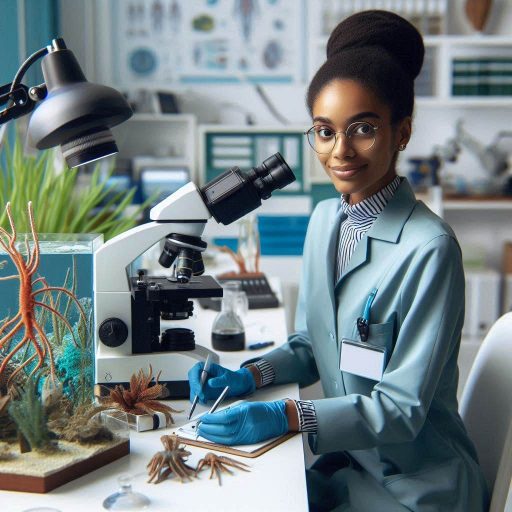Introduction
A marine biologist is a scientist who studies marine organisms and their ecosystems.
They are responsible for researching, analyzing, and monitoring various aspects of marine life.
Marine biologists conduct fieldwork, collect samples, and analyze data to understand marine ecosystems.
They also study the behavior, physiology, and distribution of marine species.
With a focus on conservation and environmental protection, marine biologists work to preserve marine habitats and species.
They may also work with policy makers and stakeholders to develop strategies for sustainable marine management.
Marine biologists collaborate with other scientists, researchers, and educators to share knowledge and findings.
They may also participate in public outreach programs to raise awareness about marine conservation issues.
Overall, marine biologists play a crucial role in advancing our understanding of marine ecosystems and promoting conservation efforts.
Their work is vital for protecting the health and diversity of our oceans for future generations.
Education and Qualifications
Bachelor’s Degree in Marine Biology or Related Field
Becoming a marine biologist requires a solid educational foundation.
Most marine biologists start with a bachelor’s degree in marine biology or a related field.
This degree provides essential knowledge about ocean ecosystems, marine organisms, and environmental science.
Students often take courses in biology, chemistry, physics, and ecology to build their understanding.
Hands-on experience is vital in this field.
Many programs incorporate laboratory work and field studies.
This practical training helps students apply classroom theories to real-world situations.
Fieldwork might involve collecting samples, observing marine life, or assessing ecosystems.
Such experiences enhance students’ skills and understanding of marine environments.
Advanced Degrees for Research or Academic Positions
After obtaining a bachelor’s degree, some marine biologists pursue advanced degrees.
A master’s degree or Ph.D. can open doors to research or academic positions.
Advanced degrees often focus on specialized areas, such as marine ecology, conservation biology, or fisheries science.
Graduate programs emphasize research methodologies, advanced statistics, and data analysis.
These skills are crucial for conducting independent research and contributing to scientific knowledge.
Experience with Fieldwork and Research Projects
Research experience is essential for aspiring marine biologists.
Many graduate programs require students to complete a thesis or research project.
This experience allows students to explore specific topics in depth.
They learn to design experiments, analyze data, and present their findings effectively.
Engaging in research during undergraduate studies can also provide a competitive edge.
Internships and volunteer opportunities can enhance a marine biologist’s qualifications.
Many organizations, such as aquariums, research institutes, and conservation groups, offer internships.
These experiences provide valuable networking opportunities and practical skills.
Internships often involve assisting with research, conducting surveys, or educating the public about marine issues.
Such hands-on experience can significantly enhance a candidate’s resume.
Professional development is vital in this ever-evolving field.
Marine biologists should stay updated on current research and advancements.
Attending conferences, workshops, and seminars can help them expand their knowledge and skills.
Joining professional organizations, like the Marine Biological Association, can also provide valuable resources and networking opportunities.
In essence, aspiring marine biologists should focus on obtaining a bachelor’s degree in marine biology or a related field.
Advanced degrees can lead to specialized research or academic positions.
Gaining experience through fieldwork, research projects, and internships is crucial.
By building a solid educational foundation and gaining practical experience, marine biologists can prepare for rewarding careers in the field.
Read: Challenges and Rewards: The Dual Life of an U.S. Environmental Scientist
Research and data collection
Marine biologists play a crucial role in understanding ocean life.
They conduct experiments, study ecosystems, and analyze data to help preserve marine species.
Conducting Experiments and Collecting Data on Marine Life
Marine biologists conduct experiments to study various marine species and their interactions.
Through hands-on research, they gather essential data on marine organisms.
This process involves careful planning and execution of scientific methods.
In the field, marine biologists collect samples from various ecosystems.
They often dive into oceans, seas, and lakes to observe organisms in their natural habitats.
Using specialized equipment, they measure factors like temperature, salinity, and oxygen levels.
These measurements help assess environmental conditions affecting marine life.
Studying Ecosystems and Habitats to Understand Marine Species
Studying ecosystems is a significant aspect of marine biology.
Marine biologists examine different habitats, such as coral reefs, estuaries, and deep-sea environments.
By understanding these ecosystems, they gain insights into the relationships between species.
They observe predator-prey interactions and the roles of different organisms within the food web.
Data collection extends beyond individual species.
Marine biologists analyze populations to determine their health and viability.
They track changes in population dynamics over time.
This monitoring helps identify potential threats, such as overfishing and habitat destruction.
Analyzing Data to Identify Trends and Patterns in Marine Biology
Once marine biologists gather data, they move on to analysis.
They use statistical tools to identify trends and patterns in their findings.
This analysis provides valuable information about the health of marine ecosystems.
It allows them to assess the impacts of human activities on marine life.
In addition to collecting and analyzing data, marine biologists often collaborate with other scientists.
They share findings and contribute to broader research initiatives.
This collaboration enhances their understanding of complex marine systems.
Research in marine biology can also lead to significant conservation efforts.
By identifying endangered species, marine biologists advocate for protective measures.
Their work influences policies and regulations aimed at preserving marine ecosystems.
They often participate in public awareness campaigns to educate communities about marine conservation.
Furthermore, marine biologists publish their research in scientific journals.
These publications contribute to the global knowledge base on marine life.
By disseminating their findings, they help inform future studies and conservation strategies.
In summary, research and data collection are fundamental to marine biology.
Through experiments, data analysis, and collaboration, marine biologists deepen our understanding of ocean ecosystems.
Their work not only advances scientific knowledge but also plays a critical role in marine conservation efforts.
By protecting marine life, they contribute to the health of our planet’s oceans.
the ocean and contribute valuable insights to conservation efforts and sustainable management of marine resources.
Read: Job Market Trends: Future of Chemistry Jobs in America
Conservation and Sustainability Efforts
Marine biologists play a crucial role in conservation and sustainability.
They focus on protecting endangered species and their habitats.
These scientists study marine ecosystems and identify threats to biodiversity.
By understanding these threats, marine biologists develop effective strategies to mitigate them.
Working to Protect Endangered Species and Habitats
One primary responsibility is working to protect endangered marine species.
Marine biologists assess the populations of these species and monitor their health.
They conduct field research to gather essential data on habitat conditions.
This information helps identify critical habitats that need protection.
By advocating for the establishment of marine protected areas, marine biologists contribute to preserving biodiversity.
Advising Government Agencies and Organizations on Conservation Strategies
Additionally, marine biologists advise government agencies and organizations on conservation strategies.
They collaborate with policymakers to develop effective legislation.
By sharing scientific knowledge, they help shape sustainable fishing practices.
These practices are essential for maintaining healthy marine ecosystems.
Marine biologists also participate in environmental assessments.
They evaluate the impact of human activities on marine life and recommend mitigation measures.
Educating the Public on the Importance of Marine Conservation
Education is another vital aspect of marine biologists’ work.
They educate the public about the importance of marine conservation.
By raising awareness, marine biologists encourage community involvement.
They organize workshops, seminars, and public outreach programs.
These initiatives help people understand the significance of marine ecosystems.
They emphasize how individual actions can affect marine life.
Marine biologists also engage with local communities to promote sustainable practices.
They teach people about responsible fishing, waste management, and habitat conservation.
By fostering a sense of stewardship, they inspire others to protect the marine environment.
Collaboration is crucial for marine biologists working in conservation.
They often partner with non-profit organizations and other scientists.
This teamwork enhances research efforts and expands outreach initiatives.
Together, they address complex environmental challenges and develop comprehensive solutions.
In review, marine biologists play a vital role in conservation and sustainability efforts.
They work tirelessly to protect endangered species and their habitats.
By advising government agencies and organizations, they influence important conservation strategies.
Their dedication to educating the public raises awareness about marine conservation.
Ultimately, their work fosters a deeper appreciation for marine ecosystems and promotes sustainable practices.
Through these efforts, marine biologists contribute significantly to the health of our oceans.
Their commitment to conservation ensures that future generations can enjoy and benefit from rich marine biodiversity.
As custodians of the ocean, marine biologists make a lasting impact on the planet’s well-being.
Read: Challenges and Rewards: Navigating the Chemist Career Path
Fieldwork and Exploration in Marine Biology
Traveling to Diverse Marine Environments
Marine biologists conduct significant fieldwork to explore various marine environments globally.
They travel to diverse locations, from coral reefs to deep-sea trenches.
Each destination offers unique ecosystems teeming with life.
Traveling allows marine biologists to study different species and habitats in their natural settings.
Conducting Underwater Research
Underwater research plays a crucial role in marine biology.
Marine biologists often use scuba diving to access underwater ecosystems.
Diving provides an up-close view of marine organisms and their behaviors.
Researchers observe interactions between species and their environments while underwater.
Utilizing Submersibles for Deeper Exploration
Some marine biologists utilize submersibles for deeper explorations.
Submersibles allow access to areas unreachable by traditional diving methods.
These advanced vehicles can withstand extreme pressure in deep waters.
They are equipped with cameras and scientific instruments to collect data.
Studying Marine Life in Natural Habitats
Studying marine life in its natural habitat is essential for accurate research.
Marine biologists gather data on species behavior, reproduction, and feeding patterns.
Observing animals in their environments leads to more reliable conclusions.
It also helps scientists understand the impact of human activities on marine ecosystems.
Collaborating with Other Scientists
Fieldwork often involves collaborating with other scientists and researchers.
Teamwork enhances the quality of research and data collection.
Different expertise brings valuable insights into various aspects of marine biology.
Collaborative efforts can lead to groundbreaking discoveries about marine life.
Transform Your Career Today
Unlock a personalized career strategy that drives real results. Get tailored advice and a roadmap designed just for you.
Start NowAssessing Ecosystem Health
Additionally, fieldwork helps assess the health of marine ecosystems.
Researchers monitor water quality and identify pollution sources.
They collect samples to analyze the effects of contaminants on marine life.
This data is crucial for developing conservation strategies.
Engaging with Local Communities
Marine biologists often engage with local communities during fieldwork.
They educate the public about marine conservation and the importance of protecting ecosystems.
Building relationships with local stakeholders enhances conservation efforts.
It fosters a sense of stewardship for the oceans.
Adapting to Challenging Conditions
Field expeditions can last days, weeks, or even months.
Researchers live and work in remote locations, adapting to challenging conditions.
This experience allows them to immerse themselves in marine environments fully.
It also strengthens their commitment to marine conservation.
In short, fieldwork and exploration are vital components of marine biology.
Traveling to diverse marine environments allows scientists to study life in its natural habitats.
Through scuba diving and submersibles, they conduct critical research.
This work ultimately contributes to the preservation of marine ecosystems and the understanding of our oceans.
Read: Diverse Career Paths: From Chemist to Patent Attorney in the US

Collaboration with other scientists and experts
As a marine biologist, collaboration with other scientists and experts is a crucial part of the job.
This allows for a multidisciplinary approach to research and conservation efforts.
Working with Marine Ecologists, Conservationists, and Oceanographers
Marine biologists often work hand in hand with marine ecologists to study the interactions between organisms and their environment in ocean ecosystems.
This collaboration helps in understanding the complex relationships that exist within marine habitats.
Collaboration with conservationists is essential for marine biologists to contribute to the preservation of marine species and habitats.
By working together, they can develop strategies for sustainable management and protection of marine resources.
Working with oceanographers provides marine biologists with valuable insights into the physical and chemical properties of the ocean.
This collaboration is vital in studying how marine organisms adapt to their underwater environment.
Collaborating on Research Projects and Sharing Data
Collaboration on research projects allows marine biologists to combine their expertise with that of other scientists to address complex research questions.
By pooling resources and knowledge, researchers can achieve more significant scientific advances.
Sharing data with fellow scientists is essential for advancing scientific knowledge and understanding of marine ecosystems.
By openly exchanging information, researchers can build on each other’s work and make more informed decisions regarding conservation and management efforts.
Collaborating on research projects and sharing data also fosters a sense of community among scientists.
This sense of camaraderie can lead to long-lasting professional relationships and future opportunities for collaboration.
Attending Conferences and Workshops to Exchange Knowledge and Ideas
Attending conferences and workshops is a great way for marine biologists to connect with other professionals in the field.
These events provide opportunities to network, share research findings, and collaborate on new projects.
Conferences and workshops also offer marine biologists the chance to learn about the latest research and technologies in their field.
By staying informed about advancements in marine science, researchers can continually improve their work and contribute to the overall body of knowledge.
By participating in these events, marine biologists can engage in discussions with colleagues from around the world.
This global exchange of ideas helps researchers to gain new perspectives, challenge their assumptions, and broaden their understanding of marine ecosystems.
Basically, collaboration with other scientists and experts is an integral part of a marine biologist’s work.
By working together, sharing data, and attending conferences, researchers can advance scientific knowledge and contribute to the conservation of marine ecosystems.
Career opportunities for marine biologists
When it comes to career opportunities for marine biologists, the options are diverse and exciting.
Here are some of the paths that individuals in this field can pursue:
Jobs in Government Agencies, Research Institutions, and Conservation Organizations
Many marine biologists find employment in various government agencies, such as the National Oceanic and Atmospheric Administration (NOAA) or the Environmental Protection Agency (EPA).
These roles typically involve conducting research, monitoring marine ecosystems, and implementing conservation measures to protect marine life.
In addition to government agencies, research institutions such as universities and nonprofit organizations also offer opportunities for marine biologists.
These positions may involve studying marine habitats, conducting fieldwork, and analyzing data to further our understanding of the marine environment.
Conservation organizations, such as the World Wildlife Fund (WWF) or the Ocean Conservancy, also hire marine biologists to work on projects aimed at preserving marine species and habitats.
These roles often involve advocacy, policy development, and community outreach to promote marine conservation efforts.
Consulting Roles in Environmental Consulting Firms
Environmental consulting firms hire marine biologists to provide expertise on environmental impact assessments, marine pollution monitoring, and habitat restoration projects.
These roles require strong analytical skills, attention to detail, and the ability to communicate complex scientific concepts to clients and stakeholders.
Marine biologists working in consulting firms may conduct research, collect and analyze data, and provide recommendations to clients on how to mitigate environmental impacts and comply with regulations.
These positions offer the opportunity to work on a variety of projects across different industries, from oil and gas to renewable energy.
Opportunities for Freelance Work and Entrepreneurship in Marine Biology
For marine biologists who prefer a more independent career path, freelance work and entrepreneurship are viable options.
Freelance marine biologists can offer their services to research institutions, government agencies, or private companies on a project-by-project basis.
Entrepreneurial marine biologists may choose to start their own consulting firm, research institute, or conservation organization.
This requires strong business acumen, leadership skills, and a passion for marine conservation.
Entrepreneurs in marine biology have the freedom to pursue their own research interests and make a direct impact on marine conservation efforts.
Essentially, marine biologists have a wide range of career opportunities available to them, from working in government agencies and research institutions to consulting roles and entrepreneurship.
Whether you prefer a traditional job setting or a more independent path, there is something for everyone in the field of marine biology.
Challenges and Obstacles in Marine Biology
Marine biologists face significant challenges in their field.
Pollution poses a severe threat to marine ecosystems.
Contaminants like plastics and chemicals harm marine life and disrupt habitats.
Marine biologists work tirelessly to study these effects and advocate for cleaner oceans.
Dealing with Pollution, Climate Change, and Overfishing
Climate change creates additional pressures on marine environments.
Rising temperatures and ocean acidification threaten coral reefs and other vital habitats.
Marine biologists monitor these changes and seek ways to mitigate their impacts.
They engage in research to understand how species adapt to these shifts.
Overfishing further complicates marine conservation efforts.
Many fish populations have declined due to unsustainable fishing practices.
Marine biologists study fish populations and develop strategies to promote sustainable practices.
They collaborate with fisheries to ensure the long-term viability and health of marine resources.
Limited Funding and Resources for Research Projects
Limited funding and resources also challenge marine biology research.
Many marine research projects rely on grants and donations.
Securing funding can be difficult, limiting the scope of research.
This situation often hinders the ability to conduct comprehensive studies.
Marine biologists must creatively seek funding from various sources.
They also engage in public outreach to raise awareness about their work.
Balancing Conservation Efforts with Economic Interests
Balancing conservation efforts with economic interests is another challenge.
Coastal communities often depend on fishing and tourism for their livelihoods.
Marine biologists must navigate these economic pressures while advocating for sustainable practices.
They work with local governments and stakeholders to develop solutions that benefit both the environment and the economy.
Despite these obstacles, marine biologists remain dedicated to their mission.
They educate the public about the importance of marine ecosystems.
By sharing their knowledge, they inspire others to join the fight for ocean health.
Collaborative efforts between scientists, policymakers, and the public are essential for success.
Additionally, the field of marine biology continues to evolve.
New technologies, such as remote sensing and genetic analysis, enhance research capabilities.
These advancements allow marine biologists to gather data more efficiently.
As a result, they can better understand marine ecosystems and their complexities.
All in all, marine biologists confront various challenges in their work.
Pollution, climate change, overfishing, and limited resources test their resolve.
Balancing conservation with economic interests requires creativity and collaboration.
Nevertheless, marine biologists remain committed to protecting our oceans and advocating for sustainable practices.
Their efforts play a crucial role in ensuring the health of marine ecosystems for future generations.
Conclusion
Marine biologists play a crucial role in studying and preserving marine ecosystems.
Their responsibilities include conducting research, collecting data, and conserving marine life.
By understanding marine ecosystems, they can help protect endangered species and habitats.
It is important to recognize the significance of their work in preserving the delicate balance of the ocean.
Marine biologists also contribute to our understanding of climate change, pollution, and overfishing, ultimately working towards sustainable solutions for the future of our oceans.
Their work is vital in shaping policies and practices that aim to protect marine environments for future generations.
If you are passionate about marine life and enjoy conducting research in aquatic environments, a career in marine biology might be a perfect fit for you.
Consider exploring opportunities in this field, whether through academic programs, internships, or volunteering with organizations dedicated to marine conservation.
By pursuing a career in marine biology, you can make a positive impact on our oceans and contribute to the protection of marine ecosystems worldwide.
[E-Books for Sale]
The Big Book of 500 High-Paying Jobs in America: Unlock Your Earning Potential
$19.99 • 500 High-Paying Jobs • 330 pages
Explore 500 high-paying jobs in America and learn how to boost your career, earn more, and achieve success!
See All 500 High-Paying Jobs of this E-Book
1001 Professions Without a Degree: High-Paying American Jobs You Can Start Now
$19.99 • 1001 Professions Without a Degree • 174 pages
Discover 1001 high-paying jobs without a degree! Unlock career tips, skills, and success strategies for just $19.99!




